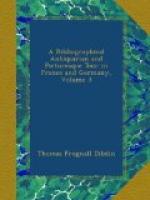“Your wishes shall be mine,” answered the Abbot. Whereupon he rose—with all the company—and stepping some few paces backwards, placed his hands across his breast upon the gold cross; half closed his eyes; and said grace—briefly and softly; in a manner the most impressive which I had ever witnessed. We then quickly left the noble room in which we had been banquetting, and prepared to visit the church and what might be called the state apartments, which we had not before seen. After the rooms at St. Florian, there was not much particularly to admire in those of Goettwic: except that they appeared to be better lighted, and most of them commanded truly enchanting views of the Danube and of the surrounding country. In one room, of smaller dimensions, ornamented chiefly in white and gold (if I remember rightly) a Collection of Prints was kept; but those which I saw were not very remarkable for their antiquity, or for their beauty of subject or of impression. The sun was now getting low, and we had a stage of at least fourteen miles to accomplish ere we could think of retiring to rest.
“Show us now, worthy Sir, your crypt and church; and then, with pain be it pronounced, we must bid you farewell. Within little more than two hours, darkness will have covered the earth.” Such was my remark to the Abbot; who replied: “Say not so: we cannot part with you yet. At any rate you must not go without a testimony of the respect we entertain for the object of your visit. Those who love books, will not object to increase their own stock by a copy of our CHRONICON GOTWICENSE—commenced by one of my learned predecessors, but alas! never completed. Come with me to my room, before we descend to the church, and receive the work in question.” Upon which, the amiable Head of the monastery set off, at rather a hurried pace, with myself by the side of him, along several corridors—towards his own apartment, to present me with this Chronicle. I received it with every demonstration of respect—and entreated the Abbot to inscribe a “dono dedit” in the fly leaf, which would render it yet more valuable in my estimation.[108] He cheerfully complied with this request. The courtesy, the frankness, the downright heartiness of feeling with which all this was done—together with the value of the present—rendered it one of the most delightful moments of my existence. I instinctively caught the Abbot’s arm, pressed his hand with a cordial warmth between both of mine—and pausing one little moment, exclaimed “Dies hic omnino commemoratione dignus!”




